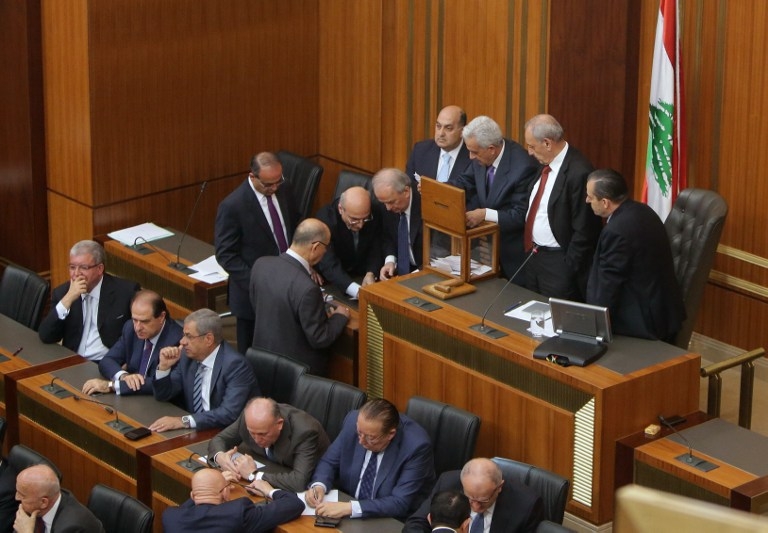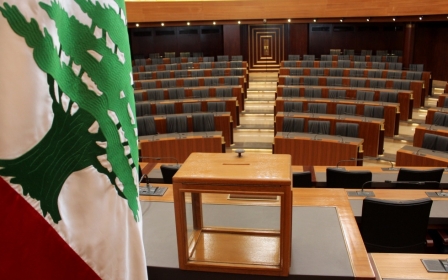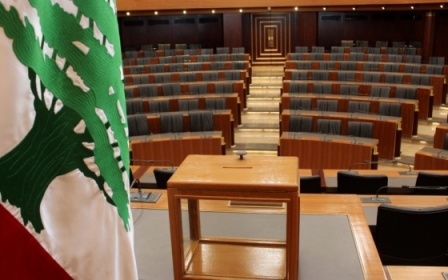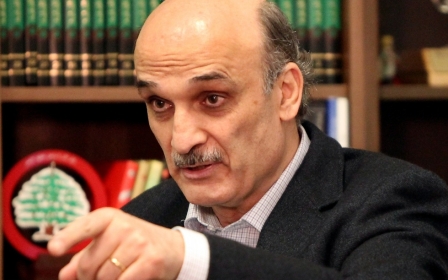Lebanon edges to finding 'consensus' president: Reports

Lebanon may soon see the addition of a consensus candidate to the list of presidential hopefuls, local media reported on Thursday.
The hope is that a less controversial line figure could help resolve the political stalemate in Lebanon, which has raged since last month when the country’s parliament failed to elect a new president, leading to the near paralysis of legislative functions.
In an attempt to resolve the deadlock, Lebanese Speaker Nabih Berri threatened to take measures against MPs who boycott Parliament, amid growing fears that the vacuum in the presidency would spread to Parliament and the rest of the government.
Christian lawmakers and the Hezbollah-backed March 8 coalition argue that Parliament should not continue to legislate while the presidency is vacant. Joining Hezbollah and Michel Aoun’s lawmakers, several Christian MPs a legislative session last week, saying they would only vote on emergency bills. Also boycotting last week’s session, was Saad Hariri’s Future Movement.
Presidential candidate, ally of March 8 coalition and Free Patriotic Movement leader Michel Aoun, said after talks with Berri Wednesday that his bloc was still mulling over whether to attend a legislative session in Parliament next week.
“We discussed urgent files that need an understanding, mainly the election of a new president and the work of both the Cabinet and Parliament in light of a presidential void,” Aoun said following his visit to Berri’s Ain al-Tineh residence.
Due to the Hezbollah-Aoun bloc’s vow to boycott legislative sessions in Parliament until a president is elected, Parliamentary sessions have not reached a quorum for several weeks.
The position of head of state has been vacant since former President Michel Sleiman’s term ended in late May, with the March 8 and 14 political blocs failing to reach a consensus on his successor.
Berri set June 9 as the new date for a presidential election session in Parliament, but no consensus has yet been achieved among Lebanon’s political rivals over a candidate. The legislature has failed to elect a new president during the five sessions it has held so far beginning on April 23.
The presidential void has also created a new challenge for officials who have yet to agree on the mechanism of the Cabinet’s work in the absence of a head of state.
After a meeting between Berri and Interior Minister Nouhad Machnouk Wednesday, Machnouk said, “The presidential vacuum does not only concern a certain sect or political party. It is a problem for all Lebanese who will collaborate to end this vacuum, but not through obstructing the work of institutions.”
Factions have been using the disruption of the political process as a way to exercise political pressure to hasten the election of a president.
“Obstructing these two institutions, [the Cabinet and Parliament], will not hasten the election of the president,” added Machnouk.
With Machnouk being a close ally of the Future Movement, his comments suggest that the Future Movement may decide to attend next Tuesday’s legislative session despite their earlier boycott. Future MPs have regularly attended previous legislative sessions along with parliamentary sessions aimed at electing a new president.
“It is a joint responsibility for all,” said Sheikh Nabil Qawouq, the head of Hezbollah’s executive council. “The presidential election cannot be resolved except by consensus between March 8 and 14 groups.”
Qawouq blamed the March 14 bloc for the presidential vacuum, saying they were not ready to begin serious negotiations to end the crisis.
Abdel-Hadi Mahfouz, the head of the National Media Council outlined Prime Minister Tammam Salam's concern that the executive branch and the legislature may be paralysed as a result of the presidential vacuum.
Also on Wednesday during a short visit to Beirut, US Secretary of State John Kerry urged Lebanon to elect a "fully empowered" president, free from foreign influence, as a major political crisis has left the country's top post vacant.
At the same time, The Daily Star reported that a delegation dispatched by French President Francois Hollande will soon arrive to Lebanon, which may include Emmanuel Bonne, Hollande’s political adviser for North Africa and the Middle East. The purpose of the delegation’s visit is to solve the presidential crisis, given the failure to do so thus far.
Lebanon has had no president since May 25, when Michel Sleiman's mandate expired because the two rival blocs that dominate politics have been unable to agree on a successor.
Lebanon, which was dominated by Syria for nearly 30 years until 2005, is sharply divided into pro- and anti-Damascus camps.
Shiite-led Hezbollah and its allies back Syrian President Bashar al-Assad, and the Sunni-led March 14 coalition supports the revolt battling to oust him.
Kerry said it is important for Lebanon to fill the presidential void, and that "it's also important for the region."
While the Hezbollah-led camp has the backing of Damascus and Iran, March 14 has the support of Washington and Middle East kingpin Saudi Arabia.
In the two months leading up to the end of Sleiman's mandate, parliament convened five times to try to elect a successor, but never got a quorum.
New MEE newsletter: Jerusalem Dispatch
Sign up to get the latest insights and analysis on Israel-Palestine, alongside Turkey Unpacked and other MEE newsletters
Middle East Eye delivers independent and unrivalled coverage and analysis of the Middle East, North Africa and beyond. To learn more about republishing this content and the associated fees, please fill out this form. More about MEE can be found here.




